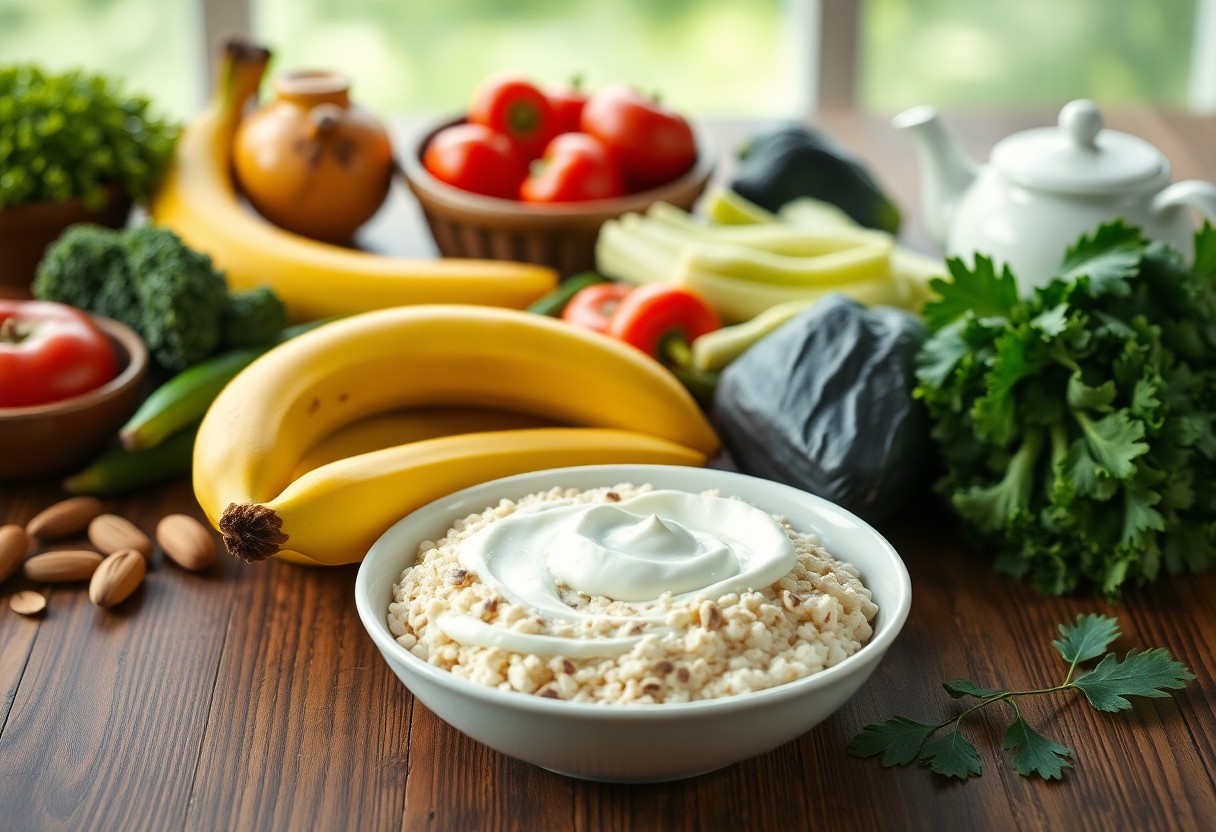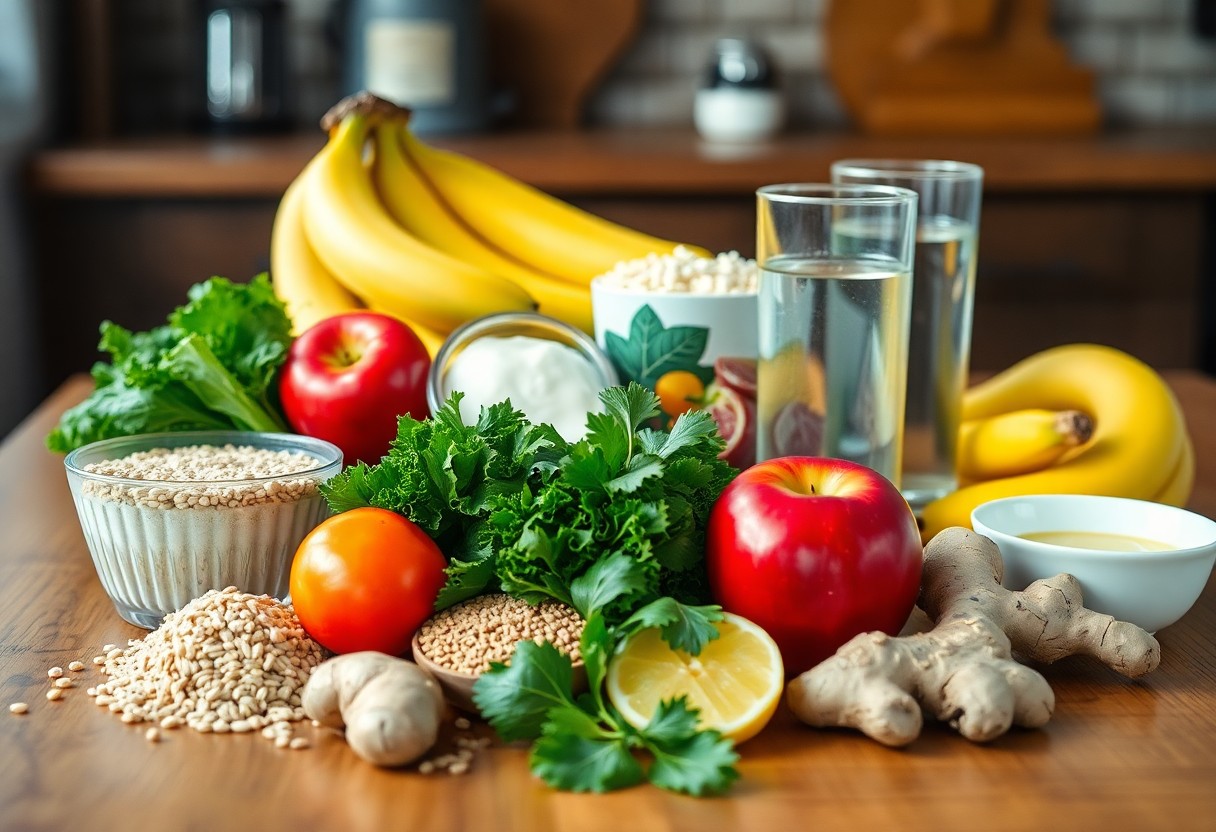Over time, you may experience digestive issues that can affect your overall health and well-being. Understanding what to eat is necessary for managing these problems effectively. A diet rich in fiber, low in processed foods, and tailored to your body’s specific needs can significantly improve your digestive health. Foods like whole grains, fruits, and probiotics can alleviate discomfort, while it’s important to avoid certain trigger foods. This guide will provide you with practical advice on optimizing your diet for better digestion.
Key Takeaways:
- Incorporate high-fiber foods such as fruits, vegetables, whole grains, and legumes to help promote healthy digestion.
- Avoid processed foods, high-fat meals, and sugary snacks, which can exacerbate digestive issues.
- Stay hydrated and consider probiotics, as they can support gut health and may alleviate some digestive problems.

The Role of Food in Digestive Health
Your diet plays a significant role in maintaining digestive health, as certain foods can either alleviate or exacerbate symptoms of digestive problems. Foods rich in fiber, such as fruits, vegetables, and whole grains, can help regulate digestion and prevent constipation. Conversely, high-fat, heavily processed foods tend to slow down digestion and can lead to discomfort. Staying hydrated and consuming probiotics through yogurt or fermented foods can also promote a healthy gut. Making informed food choices can create a more balanced digestive environment.
Identifying Trigger Foods
Understanding the Impact of Gut Microbiome
Your gut microbiome comprises trillions of bacteria that play a vital role in digestion, metabolism, and overall health. These microorganisms help break down food, synthesize vitamins, and regulate your immune function. A balanced microbiome promotes digestive harmony, while an imbalance can lead to issues such as IBS, bloating, or gastrointestinal infections. Incorporating prebiotic and probiotic foods can support your microbiome, ultimately aiding digestion.
Enhancing your gut microbiome can lead to improved digestive health. Consuming foods high in prebiotics, like bananas, onions, and garlic, nourishes beneficial bacteria. On the other hand, probiotics found in yogurt, kefir, and fermented vegetables add beneficial strains directly to your gut. Research suggests that a diverse diet rich in fiber and plant-based foods can increase microbial diversity, which is associated with better gut health and reduced inflammation. This connection underscores the importance of a well-rounded diet in promoting a healthy digestive system.

Nourishing Choices: What to Include in Your Diet
Embracing a diet that supports your digestive health can make a world of difference. Focus on incorporating whole, nutrient-dense foods that promote regularity and gut health. Fresh fruits and vegetables, whole grains, lean proteins, and healthy fats should be your staples. Opt for foods rich in imperative vitamins and minerals, while avoiding high-sugar, processed options that can aggravate digestive problems. Staying hydrated is also key, so don’t forget to drink plenty of water throughout the day to help keep your digestive system functioning smoothly.
Fiber-Rich Foods for Optimal Digestion
Fiber acts as a natural broom for your digestive tract, sweeping away waste and promoting regular bowel movements. Incorporate a variety of high-fiber foods, such as fruits like apples and pears, leafy greens like spinach, and whole grains like quinoa and brown rice. Legumes, such as lentils and chickpeas, are also excellent sources. The recommended daily intake for adults is around 25-30 grams, and gradually increasing your fiber can prevent discomfort while maximizing effective digestion.
The Power of Probiotics and Fermented Foods
Probiotics play a pivotal role in balancing your gut microbiome, improving digestion, and enhancing nutrient absorption. Foods like yogurt, kefir, sauerkraut, and kimchi are rich in natural probiotics that help to replenish beneficial bacteria in your gut. Including these fermented foods in your diet can not only aid digestion but also boost your immune system and provide imperative vitamins. Aim for a daily serving to support your digestive health efficiently.
Research indicates that incorporating probiotics into your diet can alleviate symptoms of gastrointestinal issues significantly. For instance, a study found that participants who consumed yogurt with active cultures experienced a marked improvement in bloating and irregularity within weeks. Fermented foods also contain enzymes that assist in breaking down food, making it easier for your body to absorb nutrients. By nurturing your gut flora, you can enhance your overall health while enjoying a diverse and flavorful diet.
Foods to Avoid: What Might Hurt Your Digestive System
Identifying problematic foods is imperative for managing digestive issues. Common culprits often include items that are difficult to digest or irritate the gut lining. Foods high in sugar, artificial additives, and too much processed fat can disrupt the balance of your digestive system, leading to discomfort. Limiting these foods can improve your overall digestive health and contribute to a better quality of life.
Common Offenders: Processed and High-Fat Foods
Many processed foods, such as fast food or packaged snacks, often contain high levels of fat, sugar, and preservatives that can be taxing on your digestive system. These foods may lead to bloating, gas, or even more serious gastrointestinal issues. Instead, you should focus on whole, unprocessed foods like fruits, vegetables, and whole grains, which are easier on the gut and offer numerous health benefits.
Recognizing Food Intolerances and Allergies
Understanding your body’s responses to certain foods can help in identifying food intolerances or allergies. Symptoms like bloating, gas, or abdominal pain soon after eating can indicate a reaction to specific ingredients. Keeping a food diary to track your meals and symptoms can reveal patterns and help you pinpoint offenders.
Many people underestimate the impact of food intolerances or allergies on digestive health. For example, lactose intolerance affects about 68% of the global population, causing discomfort when consuming dairy products. Similarly, gluten sensitivity can lead to gastrointestinal pain, fatigue, and disruption of daily life. It’s beneficial to conduct elimination diets or consider testing to determine which specific foods may be causing your issues, allowing for better dietary adjustments that cater to your unique digestive needs.
The Importance of Hydration and Its Effects on Digestion
Hydration significantly impacts digestion, as water plays a vital role in the breakdown and absorption of nutrients. Optimal hydration helps the digestive system function effectively, preventing issues like constipation and bloating. Insufficient water intake can hinder your digestive processes, leading to discomfort and complications over time. Ensuring adequate hydration supports the mucosal lining of the gastrointestinal tract, promoting overall gut health and facilitating smoother digestion.
How Water Aids Digestion
Water is vital for digesting food and maintaining proper functioning of your digestive organs. It helps dissolve nutrients, making them more accessible for absorption. Additionally, water softens stool, which can significantly reduce your risk of constipation. Aim to drink at least eight 8-ounce glasses of water daily, adjusting based on your activity level, climate, and personal needs.
The Role of Herbal Teas and Infusions
Herbal teas and infusions can complement hydration and provide additional benefits for digestive health. Ingredients such as peppermint, ginger, and chamomile may soothe the stomach, relieve bloating, and improve digestion. Enjoying a warm cup of herbal tea could enhance relaxation and create an overall positive impact on your digestive system.
Incorporating herbal teas, like ginger tea, can be particularly beneficial for those struggling with nausea or bloating. Ginger contains natural anti-inflammatory properties that ease discomfort in the digestive tract. Peppermint tea, known for its ability to relax the muscles of the gastrointestinal system, may alleviate symptoms of irritable bowel syndrome (IBS) and improve overall digestion. Choosing caffeine-free herbal blends over traditional teas ensures you avoid any potential aggravation, allowing your digestive system to thrive while providing you with hydration and comfort.
Lifestyle Adjustments to Enhance Digestive Wellness
Enhancing your digestive wellness goes beyond dietary choices; it also involves making necessary lifestyle adjustments. Simple changes, such as incorporating regular physical activity, can stimulate bowel movements and improve overall gut health. Establishing a consistent routine for eating, sleeping, and managing stress can further promote digestive balance. Prioritizing time outdoors or engaging in relaxation techniques, like yoga or deep breathing, can create a more harmonious environment for your digestive system to function effectively.
The Connection Between Stress and Digestion
The relationship between stress and digestion is profound; high stress levels can lead to various digestive issues, including bloating, constipation, and even irritable bowel syndrome (IBS). Stress activates the body’s fight-or-flight response, which can divert energy away from digestion and disrupt the digestive process. To mitigate these effects, you might explore calming practices that help to lower stress levels, fostering a more supportive atmosphere for your gut.
Timing Your Meals: Frequency and Size
Strategically timing your meals can significantly affect digestion. Eating smaller, more frequent meals—typically five to six times a day—can help prevent overloading your digestive system. This approach not only keeps your metabolism steady but also allows for better nutrient absorption and reduced symptoms like bloating or discomfort. Spacing meals at regular intervals encourages your body to process food more efficiently, ultimately leading to improved digestive health.
Analyzing your meal timing, consider how consuming larger meals can overwhelm your digestive system, leading to discomfort and sluggishness. Smaller portion sizes are generally easier for your stomach to handle, and by implementing regular eating intervals—such as every three to four hours—you allow your body to maintain consistent digestion. Some studies suggest that individuals who eat this way report lower incidences of digestive issues and improved energy levels throughout the day. Keeping snacks on hand, like raw veggies or fruits, can also align with this approach, enabling you to stay nourished and avoid binge eating during mealtimes.
To wrap up
Drawing together the key points about managing digestive problems, you should focus on incorporating easily digestible foods like bananas, rice, applesauce, and toast into your diet. Prioritize fiber-rich vegetables, lean proteins, and probiotic-rich options to support gut health. Staying hydrated is necessary, so drink plenty of water. Additionally, listen to your body and identify any specific foods that may trigger discomfort for you. A well-balanced diet tailored to your needs can significantly improve your digestive well-being.
FAQ
Q: What types of foods should I avoid if I have digestive problems?
A: If you have digestive problems, it’s generally advisable to avoid foods that can irritate the digestive tract. This includes spicy foods, fatty foods, processed sugars, and artificial sweeteners. Additionally, dairy products can cause issues for some individuals, especially those with lactose intolerance. It may also be helpful to limit high-fiber foods temporarily, such as beans and whole grains, until your symptoms improve.
Q: Are there specific foods that can help soothe digestive discomfort?
A: Yes, many foods can aid in soothing digestive discomfort. Bananas, steamed vegetables, oatmeal, and broth-based soups are gentle on the stomach and easily digestible. Yogurt with probiotics can also be beneficial, as it helps restore healthy gut bacteria. Warm herbal teas, like ginger or peppermint, can soothe the digestive system and relieve nausea.
Q: How important is hydration for digestive health?
A: Staying well-hydrated is vital for good digestive health. Water helps to break down food so your body can absorb nutrients more effectively. It also helps prevent constipation by keeping the stool soft and easy to pass. Aim to drink plenty of fluids throughout the day, especially water, and consider incorporating herbal teas to aid digestion.
Q: Can eating smaller meals help with digestive issues?
A: Eating smaller, more frequent meals can greatly benefit individuals experiencing digestive problems. This approach can alleviate the burden on your digestive system, making it easier to process food without becoming overwhelmed. Focus on balanced meals that include proteins, healthy fats, and easily digestible carbohydrates, while spacing them out throughout the day.
Q: Are there any dietary changes I should consider for long-term digestive health?
A: For long-term digestive health, consider incorporating whole, unprocessed foods into your diet. A balanced intake of fruits, vegetables, whole grains, lean proteins, and healthy fats will promote gut health over time. Additionally, keeping a food diary can help you identify any specific foods that trigger your digestive issues, allowing you to make more informed dietary choices.
